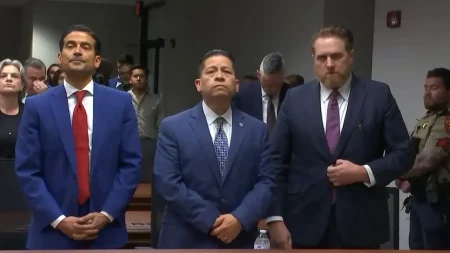Federal Raid in New York Leads to Arrests of Illegal Workers
In a significant enforcement action in upstate New York, federal authorities have arrested 57 undocumented workers in what officials describe as one of the largest workplace raids in recent history. The operation, conducted on September 4 in Cayuga County, resulted in criminal charges for five individuals who had previously been deported from the United States. This raid highlights the ongoing tensions between immigration enforcement policies and labor practices across the country, especially in regions with higher unemployment rates where officials argue jobs should be prioritized for authorized workers.
The five individuals facing criminal charges for illegal reentry include Alex Ben Chipin (39), Argentina Juarez-Lopez (50), Luis Jom-Morales (27), and Gregorio Baldemar Ramirez-Perez (45) from Guatemala, as well as Francisco Salvardo-Mora (22) from Mexico. These specific cases have drawn particular attention as they involve people who had previously been removed from the United States and subsequently returned without authorization. The remaining 52 workers detained during the operation face administrative proceedings through the immigration court system rather than criminal charges. Each of the five charged with illegal reentry could face up to two years in prison, fines of up to $250,000, and supervised release if convicted.
Acting U.S. Attorney John Sarcone III emphasized the economic considerations behind such enforcement actions, stating that “Across Upstate and Central New York, there are hard-working Americans in need of well-paying jobs, especially in Cayuga County where unemployment is relatively high.” This perspective frames the raid not just as immigration enforcement but as an effort to protect job opportunities for authorized U.S. workers. Sarcone’s statement sends a clear message to employers throughout the Northern District of New York that hiring unauthorized workers could subject them to criminal investigation, suggesting a broader strategy of workplace compliance enforcement that targets both employees and employers.
Homeland Security Investigations (HSI) Buffalo Special Agent in Charge Erin Keegan characterized the operation as part of an “active and ongoing criminal investigation” with multiple objectives beyond simple immigration enforcement. According to Keegan, HSI aims to identify and address exploitation in workplaces, ensure compliance with both labor and immigration laws, and protect the integrity of the American workforce. This framing attempts to position such raids within a broader context of worker protection and legal compliance rather than solely as immigration enforcement actions, though critics of such operations often argue they can have destabilizing effects on immigrant communities and local economies.
The raid in Cayuga County reflects a continuation of workplace immigration enforcement strategies that have been controversial across different administrations. While officials emphasize the legal and economic justifications for such actions, they raise complex questions about the intersection of immigration policy, labor markets, and community impact. The focus on individuals who had previously been deported suggests a prioritization of cases involving prior immigration violations, though the administrative detention of dozens of other workers indicates a broader enforcement approach that extends beyond those with criminal histories or prior deportations.
As this case moves forward through the legal system, it will likely serve as a significant reference point in ongoing debates about immigration enforcement priorities and workplace compliance strategies. The scale of the operation—with 57 arrests—makes it noteworthy even among workplace enforcement actions, which have varied in frequency and scope across different federal administrations. For the five individuals facing criminal charges, their cases will proceed through the federal court system, while the larger group of detained workers will navigate the separate and often lengthy immigration court process, where they may seek various forms of relief from deportation depending on their individual circumstances and eligibility under current immigration law.











